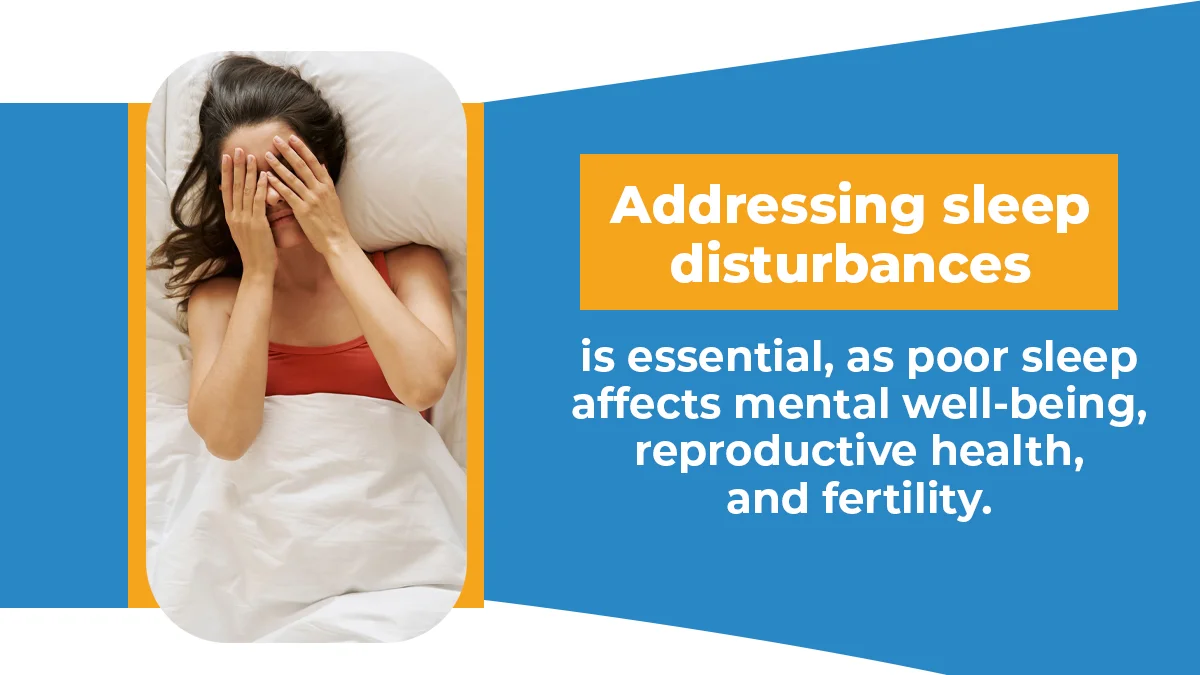
Lyrica With Suboxone: Risks And Safe Practices
The Recovery Team-Newton explores whether taking Lyrica with Suboxone is safe. Explore potential risks and guidelines

Sleep and mental health are closely related, each influencing the other. Inadequate sleep can lead to mood disturbances such as stress, anxiety, and sadness. Insufficient rest deprives the brain of the energy needed to tackle daily challenges.
Conversely, poor mental health can disrupt sleep patterns, leading to struggles in falling asleep or staying asleep. Improved sleep correlates with enhanced emotional resilience and a greater ability to navigate life’s challenges. If you are struggling with sleep disorders or mental issues, then getting treatment services can help improve your condition.
Inadequate sleep can lead to stress and sadness, impacting overall mental well-being significantly. Here’s what you need to know:
The Recovery Team-Newton is here to offer you help. Contact us today at (508) 978-2772.
Sleep is a complex process crucial for our health. It involves different sleep cycles, such as REM and non-REM, each serving essential functions. REM sleep is associated with vivid dreams, rapid eye movements, and heightened brain activity. It plays a role in learning and emotional regulation. Non-REM sleep involves deeper stages, promoting physical restoration, growth, and body maintenance.
The brain also clears waste products, promoting optimal cognitive function. Disruptions to these cycles can impact mood, concentration, and overall well-being. Understanding the science behind sleep helps emphasize its importance in maintaining physical and mental health.
Sleep is vital for your well-being. It allows the body and mind to recharge, supporting various functions. During sleep, the body repairs tissues and boosts immune function. One key purpose is memory consolidation, helping us retain information from the day.
Sleep also regulates hormones, influencing growth and stress levels. Moreover, it supports heart health by reducing the risk of cardiovascular diseases. Good sleep is vital for brain development since it removes toxins from the brain.
Understanding how sleep and mental health are closely related is crucial. Individuals with sleep disorders like sleep apnea often face challenges in maintaining good mental health. Sleep deprivation or poor sleep quality can lead to mental health problems, affecting mood and cognition.
Disruptions in sleep patterns, whether due to work, academic pressure, or other factors, can impact mental well-being. Insufficient REM sleep, a vital stage for emotional regulation, may worsen mental health disorders. Addressing sleep disturbances is essential, as poor sleep affects mental well-being, reproductive health, and fertility. Prioritizing a consistent sleep schedule and creating a relaxing sleep environment can significantly benefit mental well-being.
Mental health disorders and sleep problems often share a complex relationship, influencing each other in intricate ways. Individuals grappling with anxiety disorders, depression, bipolar disorder, or schizophrenia frequently experience disruptions in their sleep patterns, exacerbating the challenges they face.
Anxiety disorders and sleep are closely linked. Chronic anxiety can lead to difficulty falling asleep, staying asleep, or experiencing restorative sleep. Racing thoughts and excessive worry contribute to insomnia, creating a cycle where insufficient sleep intensifies anxiety symptoms. Sleep disturbances can amplify feelings of restlessness and nervousness, further impacting daily functioning.
Depression and sleep form a cyclical connection. Sleep problems are common in individuals with depression, manifesting as insomnia or, conversely, hypersomnia. Insufficient sleep can worsen depressive symptoms, contributing to a sense of fatigue, hopelessness, and difficulty concentrating. In severe cases, it may lead to suicidal thoughts.
Bipolar disorder involves extreme mood swings, including manic highs and depressive lows. Fluctuations in sleep patterns often mirror mood changes. During manic episodes, individuals may experience a decreased need for sleep, while depressive phases can lead to hypersomnia. Maintaining stable sleep routines and addressing sleep disruptions is vital for managing bipolar disorder effectively.
Schizophrenia, a complex mental health disorder, also affects sleep. Individuals with schizophrenia may encounter difficulties falling asleep, staying asleep, or managing a sleep schedule. Medications prescribed for schizophrenia can impact the sleep cycle, leading to daytime drowsiness. Addressing sleep problems is crucial in the comprehensive care of individuals with schizophrenia.
Several factors can trigger sleep disorders, impacting both physical and mental well-being. Mental illness, including specific mental health difficulties, is a significant contributor. Various risk factors, such as little sleep or irregular sleep patterns, increase the likelihood of sleep disorders. Stress hormones like cortisol can disturb the normal sleep-wake cycle. Irregular sleep schedules, inconsistent bedtime routines, and an uncomfortable environment can also negatively impact sleep quality.
The blue light emitted by your phones, tablets, and computers can disrupt the production of the melatonin hormone, making it harder for teenagers and adults to fall asleep. Moreover, lack of light during winter can also trigger sleep problems, which is a symptom of a depressive disorder known as seasonal affective disorder (SAD). These disruptions negatively impact cognitive skills, affecting memory and concentration. The prefrontal cortex, responsible for decision-making and emotional regulation, can influence mood changes.
Recognizing signs indicating compromised sleep and understanding their association with mental health conditions is crucial for proactive intervention. Signs of poor sleep quality include:
Understanding these indicators is crucial, especially considering their potential connection to mental health conditions such as major depression, neurodevelopmental disorders, attention deficit hyperactivity disorder (ADHD), and obsessive-compulsive disorder (OCD). Chronic sleep problems can disrupt circadian rhythms and compromise healthy brain function, particularly in younger children.
Quality sleep plays an important role in good mental health. Implementing effective strategies to enhance sleep can significantly contribute to overall well-being. Here are various approaches, from lifestyle adjustments to therapeutic interventions, that individuals can adopt to promote better sleep and support mental health.
Lifestyle choices play a crucial role in influencing sleep patterns and mental health. Adopting a regular sleep schedule, where one goes to bed and wakes up simultaneously daily, helps regulate the body’s internal clock.
Regular physical activity promotes better sleep, but avoiding intense exercise close to bedtime is advisable. Additionally, monitoring and moderating caffeine and alcohol intake and eating a healthy diet, particularly in the morning, can positively impact sleep quality.
Good sleep hygiene involves creating a sleep-conducive environment and cultivating habits that signal the body that it’s time to wind down. That includes keeping the bedroom dark and cozy. Moreover, investing in a comfortable mattress, sheets, and pillows and minimizing noise can help you to fall asleep quickly.
Establishing a calming bedtime routine, such as meditating, reading, or taking a warm bath, helps signal the body that it’s time to prepare for sleep and releases melatonin hormone. This chemical in the brain triggers you to fall asleep.
Stress is a common disruptor of both sleep and mental health. It can lead to excessive daytime sleepiness to avoid triggers. Adopting stress management strategies, such as meditation, yoga, or deep breathing exercises, can help calm the nerves and promote better sleep. Creating a relaxing pre-sleep routine that allows for mental unwinding is essential in reducing the impact of daily stressors on sleep.
For those facing persistent sleep difficulties, cognitive behavioral therapy for insomnia (CBT-I) is a structured therapeutic approach. CBT-I addresses the thoughts, behaviors, and patterns contributing to insomnia.
A trained therapist helps patients identify and modify negative thoughts about sleep, establish a consistent sleep routine, and develop relaxation techniques. CBT-I has shown effectiveness in improving both sleep quality and mental health outcomes.
For those facing sleep and mental health concerns, various mental health services, such as day treatment, are available to provide support and assistance. Mental health professionals, including psychologists and therapists, offer counseling and talk therapies to address underlying issues leading to sleep problems. Specialized services, like sleep clinics, focus on diagnosing and treating sleep disorders.
These services may include sleep studies to understand sleep patterns better. Collaborative care approaches, where mental health professionals coordinate with sleep specialists, ensure comprehensive support. Seeking help from these services is a positive step toward managing sleep and mental health challenges, promoting overall well-being and improved quality of life.
Sleep and mental health are closely related. Poor sleep quality can lead to mental health problems and vice versa. If you are struggling with such a condition impacting your daily routine, contact The Recovery Team-Newton.
We offer a day treatment facility, and our medical professionals assess mental health status to craft a personalized program, including therapy sessions that meet your needs. This program follows a flexible schedule.
We also offer a dual diagnosis program that our medical experts use to diagnose and treat any co-occurring mental health disorders that can be the cause of any sleep disruptions.
Wait no longer. Contact us at (508) 978-2772 today to learn more about our services.
Sleep plays an integral role in mental health. Lack of sleep causes various issues, from mood swings to impaired cognitive function. Most common sleep disorders like obstructive sleep apnea can contribute to sleep troubles, triggering or worsening psychiatric conditions like depression or anxiety symptoms. Exposure to bright light, especially before bedtime, can disrupt sleep patterns, leading to mental health issues.
Getting the right amount of good-quality sleep is essential for optimal mental health. The recommended amount varies by age but generally ranges from 7 to 9 hours for adults.
Quality sleep involves sufficient time in deep sleep, which is crucial for cognitive function and emotional well-being. Striking a balance in the amount of sleep is vital, as insufficient and excessive sleep can negatively impact mental health.
Sleep makes you feel better mentally because it allows the brain to recharge and perform essential functions. During sleep, the brain consolidates memories, regulates emotions, and clears out waste products.
Adequate sleep improves mood, sharpens cognitive function, and improves stress management. It enhances overall mental well-being by providing the necessary rest and recovery.

The Recovery Team-Newton explores whether taking Lyrica with Suboxone is safe. Explore potential risks and guidelines

Learn about Suboxone injection side effects and explore recovery solutions in this guide by The Recovery Team-Newton.